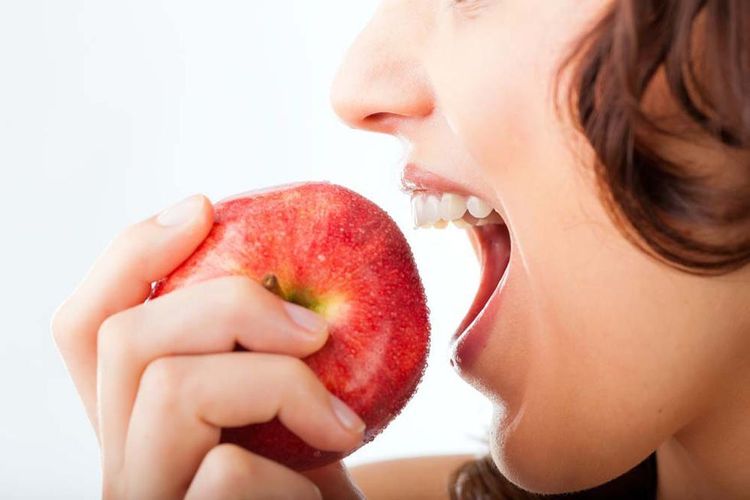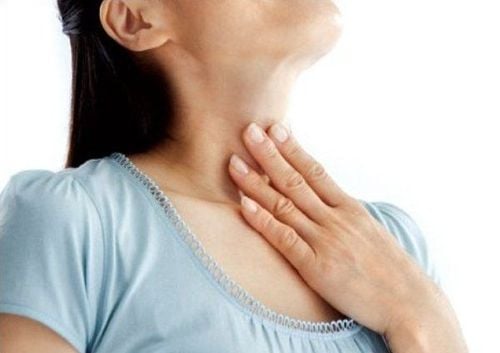This is an automatically translated article.
People with an apple allergy may experience a range of symptoms, either severe or non-severe, when eating apples. Symptoms and manifestations of an apple allergy can vary depending on the type of apple allergy the person has. Read on to learn more about apple allergy symptoms and how to avoid them.1. What causes apple allergy?
Food allergies occur when people eat something that causes their immune system to overreact. This reaction can lead to a range of unpleasant and sometimes life-threatening symptoms. An apple allergy occurs when you eat an apple and your body reacts to it, whether it's whole or in dishes like desserts or apple sauce. Apples are also found in beverages such as cider, juice and apple cider vinegar, and are used to flavor dishes such as jams and jellies.Apple allergy, like other food allergies, can take on different forms in different people. The amount of apples you eat that can cause an allergic reaction can also vary from person to person.
2. Who is likely to have an apple allergy?
2.1. Apple and birch pollen allergy Apple allergies can take many different forms. Some people who are allergic to birch pollen may have an apple allergy. This is because similarities of a protein found in apples are related to a protein in birch that has been linked to allergies to birch pollen. This type of apple allergy usually occurs in areas with a lot of birch trees, such as in Central and Northern Europe, during the springtime when birch pollen is in the air. Manifestations are usually milder reactions, symptoms develop in and around the mouth, also known as oral allergy syndrome. People with oral allergy symptoms are more likely to have fever and upper respiratory allergies.If you have this pollen allergy, regular cooking of apples can kill the allergen and prevent an allergic reaction.
2.2. Apple and Other Fruit Allergies Another type of apple allergy is related to a peach allergy. This is because the allergens in this type of allergy are the same in both peaches and apples. People with this allergy may also be allergic to other fruits and nuts such as plums, apricots, cherries, walnuts, and hazelnuts. Cooking usually won't eliminate the symptoms of an allergic reaction in this type of apple allergy. Allergic symptoms can be more severe, starting as soon as they finish eating an apple.
Women tend to be more prone to apple allergies. This type of allergy is also most common in adults and adolescents.

Phụ nữ thường dễ bị dị ứng táo hơn đàn ông
3. Apple allergy symptoms
If you are having an allergic reaction, symptoms may appear while eating or shortly after eating. Initially, you will feel that your lips are swollen. Then there may be an itching sensation in the throat or back of the mouth. Symptoms may occur when eating apples or foods containing apples. Symptoms include:Swollen lips An itchy sensation in your throat or back of your mouth Swollen eyelids Swollen eyelids Abdominal pain or cramps Diarrhea Skin rash For some people these symptoms go away after 15 minutes.
Emergency symptoms In severe cases, an emergency called anaphylaxis can occur. This is a very serious condition where your body goes into shock, your blood pressure drops, and your breathing passages narrow. People with these symptoms need immediate medical attention. Symptoms usually occur soon after exposure to the allergen in question and may include:
Shortness of breath Anxiety, confusion Slurred speech Wheezing Swelling in the mouth and throat Nausea and stomach pain Facial Swelling Difficulty Swallowing Symptoms of Oral Allergy Syndrome Doctors generally refer to oral allergy syndrome as a mild form of food allergy caused by a contact allergic reaction in the mouth and throat. This means that a person with this condition will react after their mouth touches a specific fruit, such as an apple.
People with oral allergy syndrome react to foods based on the type of seasonal allergy they have. For example, someone with an apple allergy will likely be allergic to birch pollen, which is very common in the spring.
If a person finds their seasonal allergy symptoms worse in the spring, they are more likely to develop cross-reactive oral allergy syndrome from eating apples.
Symptoms of oral allergies vary from person to person. Symptoms are mild but sometimes severe. Usually symptoms only occur in or around the mouth, and include the following:
Itchy mouth or throat Swelling of lips, mouth or tongue Itching or swelling of throat Itching of ears If you have ever had allergic syndrome In addition to the food that causes you to be allergic, some of the following foods should be avoided:
Almonds, sunflower seeds, Carrots, cherries, peaches, pears, plums, tomatoes, oranges, kiwi , banana, cucumber. Celery, squash, birch pollen, ragweed

Nếu bị dị ứng táo, bạn có thể có cảm giác ngứa trong miệng hoặc cổ họng sau khi ăn
4. Treatment direction
In the case of a non-severe apple allergy, it is best to avoid eating apples. In some cases, people with oral allergy syndrome can eat cooked apples, because cooking apples can change the protein that causes the reaction. The same is true of other fruits that cause oral allergy syndrome.People who have a hypersensitivity reaction to apples or any substance need immediate medical attention. Treatment for a person with a life-threatening food allergy will include:
Immediately administering one or more epinephrine injections (EpiPen) as prescribed by a doctor Intravenous drugs, including antihistamines and cortisone Oxygen and albuterol to help with breathing Medical follow-up to make sure anaphylaxis is resolved
5. Prevention
Apples are not a common ingredient in non-food products, so it's important that you control what you're eating and its ingredients. The best way to avoid an allergic reaction is to avoid the foods that cause it. Make sure you know your allergy level and which apple foods to avoid. Some people are allergic to birch pollen, can tolerate processed apples or apples as ingredients after heating.If you have ever had an apple allergy or have a family history of an apple allergy, talk to your doctor or dietitian about which fruits and vegetables are safe for you to eat.
If you have any questions related to the topic of nutrition for the body that need advice from a doctor, you can leave your question in the ASK VINMEC DOCTOR section directly on the hospital website. Your question will be sent to the doctor and you will receive a consultation as soon as possible!
Please dial HOTLINE for more information or register for an appointment HERE. Download MyVinmec app to make appointments faster and to manage your bookings easily.
Reference sources: healthline.com, medicalnewstoday.com












